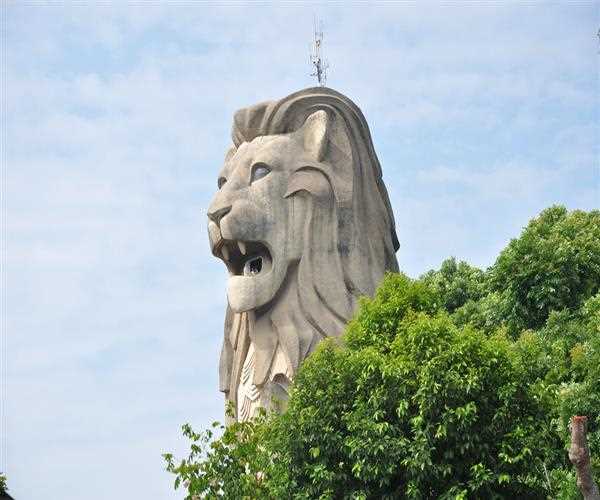
11-Aug-2023 , Updated on 8/11/2023 7:44:35 AM
Lion city- Uncovering the fascinating story and origins of Singapore's name
Highlights
- Symbolism of Lions- Despite the fact that lions are not found in Singapore it is believed that the name was chosen because the island is associated with qualities, like strength and courage which lions symbolize in cultures.
- Sang Nila Utama- The story of Sang Nila Utama, a prince from the century is often linked to the naming of Singapore. According to legend he spotted a creature resembling a lion on the island. Named it "Singapura," which means "Lion City" in Sanskrit.
- Historical Records- Early records from travelers and merchants refer to Singapore using variations of the name "Singapura" or similar terms indicating that this name has been used for a time.
- Colonial Era- During the century Singapore was established as a trading port. The British East India Company referred to the settlement as "Singapore ". Gradually this name gained recognition.
- Variations- Throughout its history the name "Singapore" has been written in forms due to translational differences, across various languages and cultures.
Situated at the crossroads of Southeast Asia Singapore is a city known for its skyscrapers busy ports and vibrant multiculturalism. However beneath its contemporary exterior lies a captivating history that has shaped the identity of this island nation. Central, to this history is the origin of its name – "Singapore " often referred to as the "Lion City." While lions have never roamed the shores of Singapore the story behind how it gained this name takes us on a journey through time, cultures and myths.
A Blend of Myth and Reality
The etymology of Singapore's name combines elements of myth and historical facts. The name "Singapore" originates from two words – "Singa" meaning lion and "Pura" meaning city. However it's important to note that lions were not native to this region; they have never roamed the jungles or beaches of the island. Instead the story, behind its name is fascinating as it intertwines events, legends and linguistic transformations.
The tale of Sang Nila Utama is the known account of how Singapore got its name and it carries a touch of romance. According to the story Sang Nila Utama, a prince hailing from the Srivijaya Empire stumbled upon a creature that resembled a lion while out on a hunting expedition.
This encounter took place on the island of Temasek, which was Singapore's name. The prince found this sighting to be a sign. Decided to establish a city on the island. He chose to call it "Singapura," which translates to "Lion City”, in Sanskrit.
Although the creature in question wasn't actually a lion but likely a Malayan tiger or another large feline species this legend highlights how mythology and reality often intertwine when it comes to naming places. The story of Sang Nila Utama has persisted over centuries. Has become a part of Singapores cultural heritage.
Singapore's history holds significance beyond this legend due to its strategic geographical location and its historical role, as a bustling trading hub. Throughout time the island has served as an intersection where diverse cultures and civilizations converged – Malay, Chinese, Indian, Arab and European influences have all left their mark on Singapore.

Throughout its history, the diverse blend of cultures has made a lasting impact, on the identity and growth of this city-state.
Even before it was officially named Singapore the island had already established itself as a trading hub. Its strategic location along routes attracted traders from China, India and the Middle East. As the Srivijaya Empire declined in the century other powers saw an opportunity to exert control over the region. Eventually the island came under the influence of both the Majapahit Empire.
The colonial era brought about changes for Singapore. In the century Sir Stamford Raffles representing the British East India Company recognized the potential of its harbor. In 1819 he established a trading post on the island which transformed into a flourishing center for trade. The British presence introduced infrastructure, urban planning techniques. Fostered a cosmopolitan environment in Singapore.
Despite expanding its role as a trading port, during colonial rule Singapore retained its name throughout this period.
The moniker "Lion City" has persisted, highlighting the enduring nature of the legend and the importance of the citys origins.
Modern Identity and Global Hub
Singapore's transformation, from a trading post to an economic powerhouse is truly remarkable. Since gaining independence from Malaysia in 1965 Singapore has faced challenges, such as land and resources. However visionary leadership, efficient governance and strategic planning have paved the way for progress and development.
Today Singapore stands as a symbol of prosperity, technological advancements, and cultural diversity. Its skyline is adorned with towering skyscrapers housing corporations while its world-class port continues to facilitate trade. The city's dedication to education, sustainability, and quality of life has earned it a reputation as one of the cities globally.
The name "Singapore" encompasses more, than a label; it encapsulates an intriguing mix of history, folklore and cultural convergence. While it remains uncertain whether mythical lions ever roamed this island nations shores the significance associated with lion symbolism endures in the hearts of its people.
The tale of Sang Nila Utama and the Lion City is a reminder that the origins of a locations name can be as varied and complex, as the tapestry of its past. From its beginnings as a trading post to becoming a global center Singapore's evolution is a testament, to the remarkable forces of creativity, adaptability and the undying curiosity that fuels human exploration.

SEO and Content Writer
I am Drishan vig. I used to write blogs, articles, and stories in a way that entices the audience. I assure you that consistency, style, and tone must be met while writing the content. Working with the clients like bfc, varthana, ITC hotels, indusind, mumpa, mollydolly etc. has made me realized that writing content is not enough but doing seo is the first thing for it.
Join Our Newsletter
Subscribe to our newsletter to receive emails about new views posts, releases and updates.
Copyright 2010 - 2026 MindStick Software Pvt. Ltd. All Rights Reserved Privacy Policy | Terms & Conditions | Cookie Policy